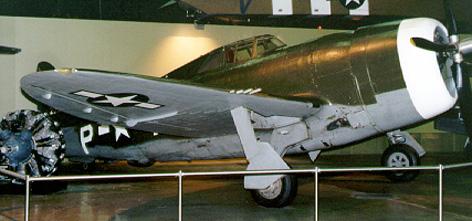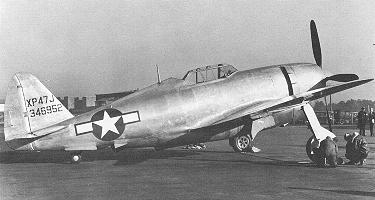 The P-47 was one of America's leading fighter airplanes of WW II.
It made its initial flight on May 6, 1941, but the first production article was not
delivered to the AAF until March 18, 1942, more than three months after the attack on
Pearl Harbor. On April 8, 1943, the P-47 flew its first combat mission, taking off from
England for a sweep over western Europe. During the next several months, AAF pilots
learned that the Thunderbolt could out-dive any Luftwaffe airplane encountered. An
auxilary fuel tank was suspended under the fuselage beginning in 1943, permitting the P-47
to escort AAF heavy bombers much farther into German territory.
The P-47 was one of America's leading fighter airplanes of WW II.
It made its initial flight on May 6, 1941, but the first production article was not
delivered to the AAF until March 18, 1942, more than three months after the attack on
Pearl Harbor. On April 8, 1943, the P-47 flew its first combat mission, taking off from
England for a sweep over western Europe. During the next several months, AAF pilots
learned that the Thunderbolt could out-dive any Luftwaffe airplane encountered. An
auxilary fuel tank was suspended under the fuselage beginning in 1943, permitting the P-47
to escort AAF heavy bombers much farther into German territory. In addition to establishing an impressive record as a high-altitude escort fighter, the P-47 gained recognition as a low-level fighter-bomber because of its ability to absorb battle damage and keep flying. By the end of the war, the Thunderbolt had been used in every active war theater with the exception of Alaska. in addition to serving with the AAF, some were flown in action by the British, Free French, Russians, Mexicans, and Brazilians.
The P-47D shown here is one of more than 15,600 built and was donated to the U. S. Air Force Museum by Republic Aviation Corporation in Nov. 1964.
 The model XP-47J, which did not go into production, was the fastest. On August 4,
1944, the plane reached a speed of 504 miles per hour.
The model XP-47J, which did not go into production, was the fastest. On August 4,
1944, the plane reached a speed of 504 miles per hour.



